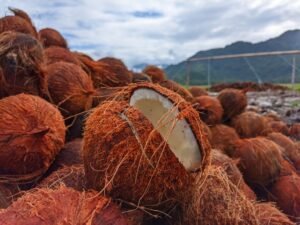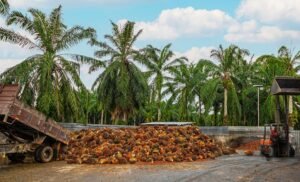
Indian Semi-Husked Coconut Export Industry: Complete Guide

Semi-Husked Coconut Export: A Growing Force in Global Trade
India’s semi-husked coconut export is one of the booming industries in the international agri-trade business. Famed for their longer shelf life, easier tractability, and multiple-purpose value, semi-husked coconuts are in keen demand in countries located in the Middle East, Europe, and Asia. Being one of the largest producers of coconut-growing belts and boasting robust agri-export infrastructure, India is one of the largest players in this industry.
Over the past few years, Indian coconut exporters have streamlined their operations, adopted international standards, and increased their networks to cater to more and more international buyers. They have invested heavily in modern processing facilities and quality control systems to ensure compliance with global safety and quality benchmarks. The focus on sustainable farming practices and certifications, such as organic and fair trade, has also enhanced India’s reputation in the global coconut trade.
Over the past few years, Indian coconut exporters have streamlined their operations, adopted international standards, and increased their networks to cater to more and more international buyers. They have invested heavily in modern processing facilities and quality control systems to ensure compliance with global safety and quality benchmarks. The focus on sustainable farming practices and certifications, such as organic and fair trade, has also enhanced India’s reputation in the global coconut trade.
Why Semi-Husked Coconut is in High Global Demand
Semi-husked coconuts strike the right balance between protection and usability. They carry part of the fibrous outer cover, which maintains moisture and avoids spoilage over lengthy transit periods. Which is why they are revered by exporters as much as importers.
Exporters employ semi-husked coconuts for various purposes like industrial, religious, food, and retail. Their ability to stay fresh for weeks and the good name of India for turning out quality coconuts have given them an added boost all over the world.
Exporters employ semi-husked coconuts for various purposes like industrial, religious, food, and retail. Their ability to stay fresh for weeks and the good name of India for turning out quality coconuts have given them an added boost all over the world.
Major Coconut-Producing States in India
India’s strength in the coconut trade is largely due to its naturally favorable geography, especially in the southern region, which accounts for a significant share of the country’s coconut production. Of the major cotton-growing states, Tamil Nadu is distinctive since it’s a long-grown variety and it produces cotton throughout the year.
Kerala, which has a long tradition of coconut farming, has been one of the most reliable producers. Karnataka is also an important contributor, providing a combination of large plantations and supplies from small-scale farmers. These three states have a tropical climate, good soil, and well-developed networks of farmers, which make them a dependable and high-quality source for fresh coconuts.
Kerala, which has a long tradition of coconut farming, has been one of the most reliable producers. Karnataka is also an important contributor, providing a combination of large plantations and supplies from small-scale farmers. These three states have a tropical climate, good soil, and well-developed networks of farmers, which make them a dependable and high-quality source for fresh coconuts.
Export Documentation and Compliance Process
Exporting semi-husked coconut from India requires strict adherence to government regulations and international compliance. Proper documentation is needed for smooth customs clearance and successful overseas trade.
Key export documents are,
Key export documents are,
- Phytosanitary Certificate: Verifies that the cargo is pest- and disease-free.
- Certificate of Origin: Specifies that the coconuts originate from India.
- FSSAI Certification: Guarantees food safety standards compliance.
- Commercial Invoice and Packing List: Details product quantity, grade, and packing.
- Bill of Lading or Airway Bill: Serves as a receipt and evidence of shipment.
Exporters are also required to have coconuts graded and packed as per the specifications of the buyer and to achieve quality standards.
Global Markets and Why Buyers Prefer Indian Coconuts
Effective logistics are necessary for maintaining the freshness of coconuts and delivering them on time to overseas markets. India has an advanced port infrastructure that enables easy handling of agricultural exports, providing coconut traders with access to major international shipping routes. Major ports like Cochin, Tuticorin, and Chennai are strategically located near key coconut-producing regions, minimizing transit time from farm to port.
The integration of real-time tracking systems and digital documentation has streamlined customs clearance and reduced delays, giving Indian exporters a competitive edge in timely deliveries. Also, the majority of Indian coconut exporters offer CIF (Cost, Insurance, and Freight) pricing terms, which facilitate global buyers controlling costs by including shipping and insurance in the overall price.
The integration of real-time tracking systems and digital documentation has streamlined customs clearance and reduced delays, giving Indian exporters a competitive edge in timely deliveries. Also, the majority of Indian coconut exporters offer CIF (Cost, Insurance, and Freight) pricing terms, which facilitate global buyers controlling costs by including shipping and insurance in the overall price.
Logistics and Port Infrastructure Supporting Coconut Export
Efficient logistics play a key role in maintaining coconut freshness and timely delivery. India’s waterway is designed to handle agri-exports, and coconut traders have easy access to major international shipping routes.
Some of the principal seaports used for exporting coconuts are,
Some of the principal seaports used for exporting coconuts are,
- Chennai Port(Tamil Nadu): A hub for bulk agricultural exports with container facilities.
- Cochin Port(Kerala): Known for faster clearance of perishables.
- New Mangalore Port(Karnataka): Has excellent access to the Middle East and Southeast Asia.
Most of the Indian suppliers of coconuts in India produce CIF prices available, which make sure the importer gets the coconuts, including the charge of shipping and insurance, so it is fair for the international clients.
How to Start a Coconut Export Business in India
For entrepreneurs looking to enter the semi-husked coconut export industry, India offers a conducive ecosystem. Starting a coconut export business requires both planning and regulatory approvals.
Here’s how you can begin:
Here’s how you can begin:
- Register a Business: Choose a legal entity (proprietorship, partnership, or private limited company).
- Obtain an Import Export Code(IEC): Mandatory for all exporters in India.
- Register with APEDA: The Agricultural and Processed Food Products Export Development Authority provides resources, training, and financial support.
- Build Supplier Relationships: Partner with reliable coconut farms or traders in Tamil Nadu, Kerala, or Karnataka.
- Invest in Packaging and Grading Units: Proper handling and grading improve product value and shelf life.
It’s also advisable to attend trade expos, use B2B platforms, and network with freight forwarders to build an efficient supply chain.
India’s Coconut Export Industry Is Set for Sustained Growth
The exports of these semi-husked coconuts not only prosper but are also becoming a key element of India’s agricultural export plan. With a supportive climate, robust state-level output, good-quality infrastructure, and government support for exports, the sector has the potential for long-term viability.
The chain for coconuts leaving India for foreign ports and buyers from the productive farms of Southern India is getting stronger. On the other hand, for importers, semi-husked coconuts from India provide an unparalleled value proposition in terms of stability of supply, clear prices, and easy logistics and delivery. Thus, India continues to be a trusted partner and a leader in the global coconut economy even as the global demand for this product continues to rise.
The chain for coconuts leaving India for foreign ports and buyers from the productive farms of Southern India is getting stronger. On the other hand, for importers, semi-husked coconuts from India provide an unparalleled value proposition in terms of stability of supply, clear prices, and easy logistics and delivery. Thus, India continues to be a trusted partner and a leader in the global coconut economy even as the global demand for this product continues to rise.
Lorem ipsum dolor sit amet consectetur.
Lorem ipsum dolor sit amet consectetur. Consequat vulputate convallis eget mollis viverra nunc mi egestas. Risus facilisi nullam donec.


